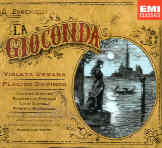There are plenty of good recordings of this opera on CD: two with Callas, one commercial production starring Caballé (with Pavarotti), and at least one “pirate” (with Carreras). There’s another “pirate” with Eileen Farrell and Franco Corelli, and others with Tebaldi, Cerquetti, and more, I’m sure, that just aren’t popping to mind at the moment. La Gioconda is a ridiculous melodrama in which every moment is so fraught with angst that it’s amazing the characters can carry on at all. There’s a mustache-twirling baritone who makes Scarpia look like Mother Teresa, a slightly less-than-one-dimensional tenor hero in love with a shallow mezzo who’s married to a powerful, malevolent bass, and a saintly, blind old alto-woman who is mother to our soprano heroine, who is named La Gioconda–“the smiling one”–despite the fact that she’s always put upon and miserable. And it doesn’t help that a turn-of-the-20th-century soprano (Lillian Nordica, I believe), who had sung the title role dozens of times, admitted to an interviewer that she had no idea what the opera was about.
But the music can thrill, the confrontations can be explosive in the best possible way, and this new recording makes a great case for the opera. Violeta Urmana, a mezzo-turned soprano, is a sensational singer with the vocal stature and broad range to do the character justice. Gioconda’s famous soft, high B-flat in Act 1 is gorgeously handled, and elsewhere Urmana can ride over the orchestra at full blast and/or dip into a rich chest voice for effect (her ascent to the brief high-C that closes the third act’s huge ensemble is both right on and audible). Dramatically Urmana misses some of the character’s more wild mood swings (Callas has them down pat in both of her recordings, and Caballé is no slouch either), but all in all, this is a big-boned, major performance.
Her Enzo is the indestructible Placido Domingo, and shockingly, this is his first recording of the opera. He’s still got it despite some phrases that seem to require a longer breath and high notes that are a bit pinched. Nonetheless, he’s totally on top of the part and rings heroic more often than not. Luciana D’Intino’s Laura is nicely sung and portrayed, although caring about this character is close to impossible, and Elisabetta Fiorillo’s blind-mama is suitably gloomy. Lado Ataneli lacks the imagination to make the wicked Barnaba delightfully loathsome–there are plenty of moments for sneering sarcasm and he misses most of them–but he’s a very good singer with a quality voice. Bass Robert Scandiuzzi is a wobbling mess as Alvise.
The leadership of Marcello Viotti is the clincher as far as a recommendation is concerned. Out of all the recorded Giocondas, this one hangs together best, the tension is highest, and the orchestra plays the music as if it were as great as Verdi’s. The recorded sound is spectacular, with absolute clarity in the soft, lightly orchestrated moments as well as the free-for-alls that show up in the first three acts. And keep your ears on Urmana–she’s a terrific singer. [5/17/2003]
































